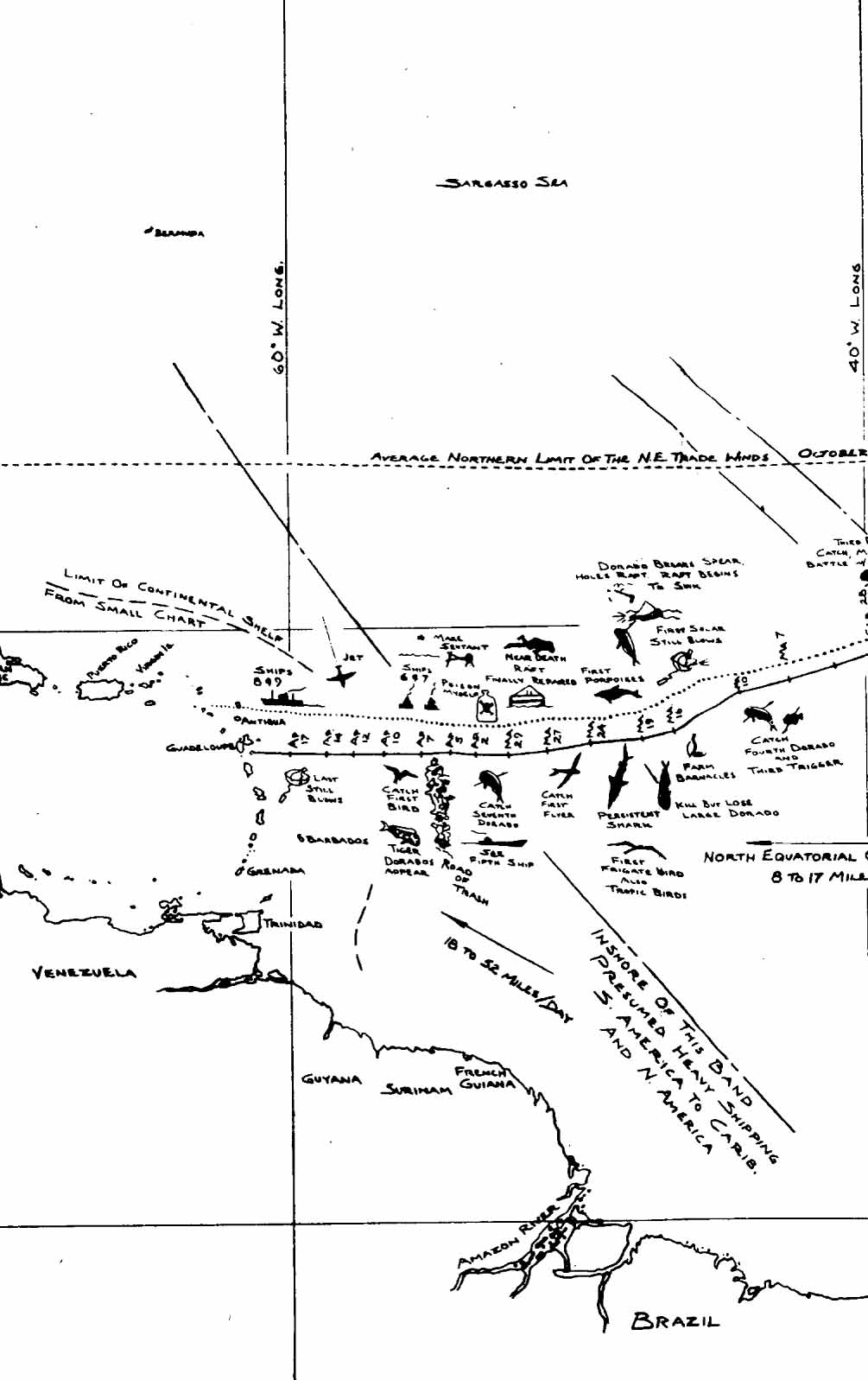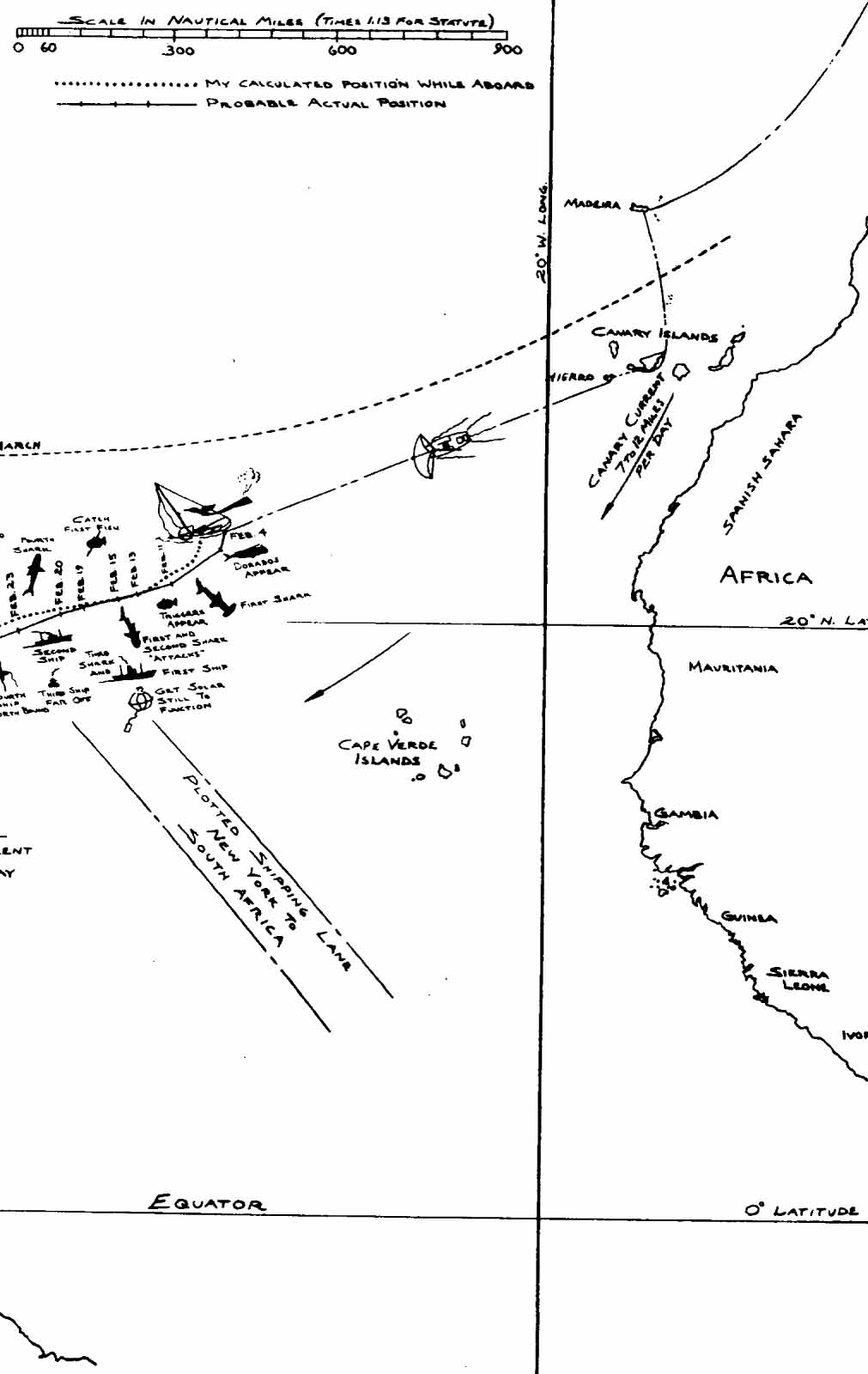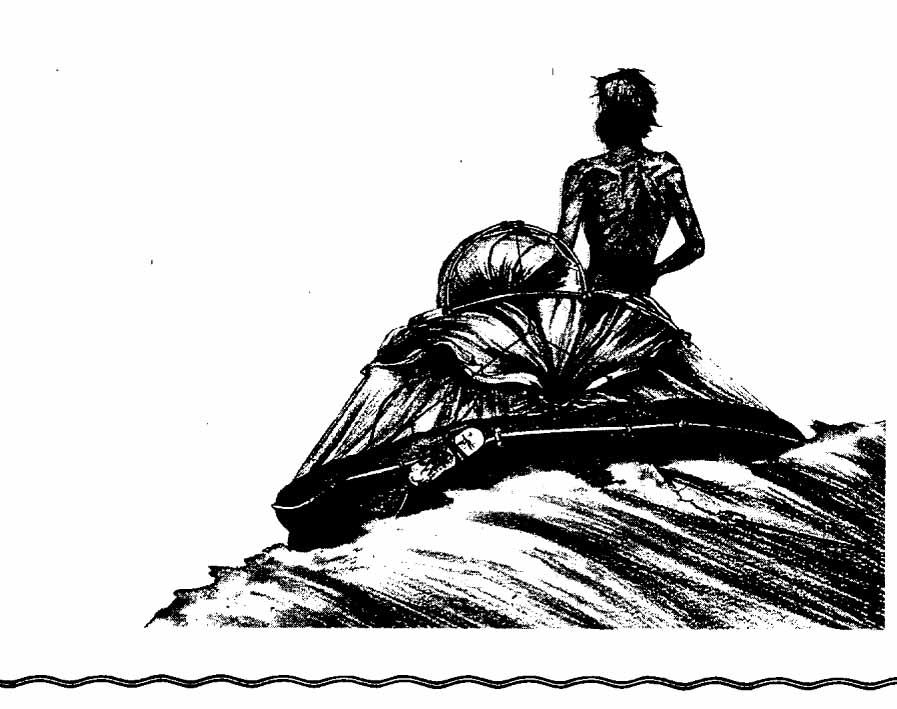Adrift
Authors: Steven Callahan

Seventy-Six Days Lost at Sea
Steven Callahan


I
LLUSTRATIONS BY THE AUTHOR
A Mariner Book
HOUGHTON MIFFLIN COMPANY
BOSTON ⢠NEW YORK

This book is dedicated to people everywhere who know, have known, or will know suffering, desperation, or loneliness.
First Mariner Books edition 2002
Copyright © 1986, 1999 by Steven Callahan
All rights reserved
For information about permission to reproduce selections
from this book, write to Permissions, Houghton Mifflin Company,
215 Park Avenue South, New York, New York, 10003.
Visit our Web site:
www.houghtonmifflinbooks.com
Library of Congress Cataloging-in-Publication Data
Callahan, Steven.
Adrift : seventy-six days lost at sea / Steven Callahan ; illustrations by the author.â1 st Mariner Books ed.
p. cm.
"A Mariner book."
Originally published: Boston : Houghton Mifflin, 1986.
ISBN
0-618-25732-2
1 Callahan, Steven. 2. Napoleon Solo (Yacht) 3. Survival after
airplane accidents, shipwrecks, etc. 4. North Atlantic Ocean. I. Title.
G
530.
C
24
C
35 2003
910'9163'1â
DC
21 2002191299
ISBN
978-0-618-25732-4 (pbk.)
Printed in the United States of America
DOC
20 19 18 17 16 15 14 13 12
Grateful acknowledgment is made to the Adventure
Library for permission to reprint new material.
Acknowledgments ix
Preface to the Mariner Edition xi
Introduction xv
Log of
Napoleon
Solo 1
Nerves Exposed 15
The Witch and Her Curse: Hunger and Thirst 31
Dream Keep 63
To Weave a World 93
Cries and Whispers 123
Twice to Hell and Back 151
Road of Trash 169
The Dutchman 185
Death 205
Life 213
A Man Alone 221
Epilogue 233
A huge number of people played a role in the creation of this book, directly and indirectly. First, there are those who introduced me to sailing and taught me the skills that enabled me to survive my experience: I am especially grateful to my parents and to the people of the Boy Scouts organization, particularly Arthur Adams. My ex-wife, Frisha Hugessen, was very supportive and tolerant of my projects, including the building of
Napoleon Solo,
while Chris Latchem helped me to achieve my goals and to develop techniques for confronting practical problems.
I am grateful to Dougal Robertson for his excellent survival manual,
Sea Survival,
which unfortunately is out of print. The Robertsons, the Baileys, and other voyagers who went before me kept me company through their books and provided not only essential practical advice but also the inspiration to pull through.
I might not ever have made it ashore had it not been for my timely meeting with the Paquet brothers and Paulinus Williams. They and the other people of Marie Galante were very kind and helpful during the final stage of my voyage and my subsequent recovery.
Kathy Massimini gave me an unbelievable amount of moral support and editorial advice throughout the writing of this book. Every author probably relies on someone like Kathy to pull him through the hard times and keep him on track, but I can't believe there are that many people out there with as much faith, tolerance, and insight.
Harry Foster, my editor at Houghton Mifflin, put a great deal of faith in me and guided me with a firm hand and patient ear.
I would also like to acknowledge all the people who aided in SAR operations and who kept circulating information and messages about me and Solo even after official channels were closed. In addition they gave my family a great deal of moral support. Among the many I would like to thank are the amateur and CB radio network, William Wanklyn, Francis Carter, Sail magazine's staff, Hood Sailmakers, Oscar Fabian Gonzales, the Steggalls, Beth Pollock, Hayden Brown, Cruising World's staff, the late Phil Weld, Mathias Achoun, his friend Freddie, and Maurice Briand. There are many others. I must also thank my family for their efforts in trying to locate me and keeping faith.
Finally, I would like to express my gratitude to the sea. It has taught me quite a lot in life. Although the sea was my greatest enemy, it was also my greatest ally. I know intellectually that the sea is indifferent, but her richness allowed me to survive. In giving up her dorados, she was giving up her own children, so to speak, in order that I might live.
I truly hope that the remainder of my life will prove worthy of all the sacrifices made on my behalf.
Shortly after the first publication of
Adrift,
a reporter from a rather prestigious newspaper concluded his interview of me with the question that virtually every interviewer inevitably asked: "Did your survival drift set some kind of record?"
As usual, I patiently explained to him that, to my mind, records are irrelevant. I'd spoken to many survivors who'd had experiences much shorter than mine but who had suffered every bit as much and had as important stories to tell. I noted that in any daily paper I could find accounts of those who somehow managed to live in circumstances I thought would be unbearable. I added that our nation's people seem consumed with recordsâlongest, biggest, farthest, fastest ... These days there are records for everything. "Why, you could be the first guy to sail around the lighthouse backwards with his pants down, and that, I suppose, would be a record," I concluded. The next day in the paper, under a photo of me, read a caption: "Callahan says about his journey that it was like sailing around the lighthouse backwards with his pants down." I got one side-splitting laugh out of that. Perhaps I should have been offended, but instead I had become fascinated by the numerous ways in which people perceived my experience. In any event, this life is full of trials and tribulations, so you have to capture humor whenever and wherever you can find it.
I have been amazed that
Adrift
has remained in print for more than a decade, and the fact that it now joins a collection of books by and about such adventurers as Slocum and Shackleton is nothing less than astounding. Although I'm very nattered and grateful, I doubt I could fill even one of Shackleton's boots. Besides, I feel far from being the sole creator of whatever I may have accomplished in my oceanic odyssey and the writing of
Adrift.
Whatever accolades I or
Adrift
have received I humbly accept, not for myself but for the incredible grace and awesome complexity of the universe. Drifting halfway across the Atlantic and learning to live like an aquatic caveman showed me time and again that I am less an individual than part of a continuum, joined to all things and driven by them more than I am in control of my own path.
Adrift
may have flowed from my hand, but it is the result of the countless forces and individuals who shaped me, led me through a remarkable experience, and allowed me to live long enough to tell it.
People have interpreted
Adrift
in many ways. Many read it strictly as an adventure tale. A great number have seen the spiritual and philosophical elements of the book, which I hope will remain enduring elements. People have interpreted these elements in numerous ways to fit their own religions and cosmologies. I will not debate them. In fact, I welcome them. Writing a book is what I imagine having a child must be like. You do your best, let it grow up and mature, then wish it well as it trots off into the world to make a life of its own.
Adrift
has done that. As readers find new meanings in it, I do not find my own views of the experience or my original intentions when writing about it diminished. They are expanded.
Still, on occasion I have heard a perception that makes me uneasy. Some people have labeled me as some kind of hero. I do admit to a certain pride that I was able to hang in there, be inventive, survive, but this is a tale about failure as much as heroism. It is a tale about the generosity of life as much as it is about the trials through which it puts us. It is a tale about second chances, which I am very happy now to have. I may have succeeded in some ways, but my drift showed me my many weaknesses only too clearly, and I'm sure I made as many errors as any person could. Years after the experience, a ten-year-old boy noted that, in
Adrift,
1 complained about the lack of wire in the fishing kit, but I described a light on the top of the raft powered by a battery in the water. "Weren't they connected by a piece of wire?" he asked innocently. Duh. Sometimes it takes the wisdom of a ten-year-old to show us how stupid we can be. Next time, he's coming along for the ride.
Ellsworth, Maine
1999
It is always difficult to decide where a story begins and where it ends. However, some experiencesâa romantic evening, a weekend retreat, or a voyageâhave fairly distinct dividing lines. They are what I call "whole experiences." To a large degree, the first twenty-nine years of my life represent one whole experience that rests outside the scope of this book. But within those years are the seeds of this story. People often ask me how I got myself into such a fix in the first place. How did I know what to do? Was the boat I lost new or had it been tried before? Why was I sailing offshore in such a small boat? The answers to these questions
are
an integral part of the story, its foundation. The foundation was laid in 1964, when, at age twelve, I began sailing.
I fell in love with sailing instantly. I can think of a million reasons why it appealed to me so stronglyâthe immediate relationship with the environment, the simplified lifestyle devoid of "modern inconveniences" (as naval architect Dick Newick puts it), the sheer beauty of itâbut all of the reasons can be summed up succinctly: everything about it felt right.
Before I ever began to sail, I thought that if I had lived in the 1700s I would probably have become a mountain man, or some such thing. Then I became enthralled with the history of the sailing ship, of square-riggers battling their way around Cape Horn. I yearned for the romanticism and adventure of ages past. Shortly after I began sailing, I read a book called
Tinkerbelle,
by Robert Manry. In June 1965 Manry had sailed his 13.5-foot boat across the Atlantic in seventy-eight days, a record at the time. Something about the simplicity of Manry's boat, and his accomplishment of so much with so little, struck a chord in my heart. He showed me that a life of adventure was still possible in the latter part of the twentieth century.
From that time on I dreamed of crossing the Atlantic in a small boat. As years went by I learned the skills necessary to accomplish this goal. I read books about all of the great voyages: the raft crossings of the Pacific by Heyerdahl and Willis, and the circumnavigations of Slocum, the Hiscocks, and Guzzwell. Before I was out of high school, I had helped to build a forty-footer; by 1974 I had begun a boatbuilding career and was living aboard; by 1977 I was designing boats and venturing offshore as far as Bermuda; by 1979 I was designing and teaching design full time. All along Manry and
Tinkerbelle
lurked in the back of my mind and served as an inspiration, a way to pull everything together and give my life a focus.